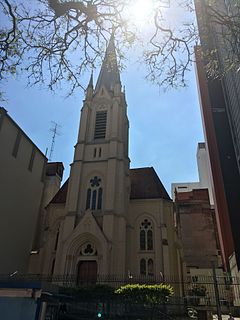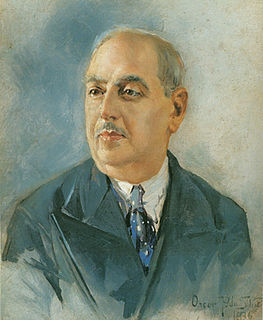
Liberdade is the name of a district in the subprefecture of Sé, in São Paulo, Brazil. By various estimates, it is home to the world's largest ethnic Japanese community outside Japan.
Recreio dos Bandeirantes is both the name of a beach and neighborhood in the West Zone of Rio de Janeiro, Brazil. It is a recent development, with no skyscrapers, and the area also contains jungles atop rocky cliffs and hills. High waves permit surfing at Recreio Beach and the white sand beach is used by beach volleyball players. It is about 35 km from the Rio de Janeiro city centre, and most of the people living there are middle-class and high middle-class families, who moved in trying to escape the growing violence of both the North and South Zones.

The Anglican Episcopal Church of Brazil is the 19th province of the Anglican Communion, covering the country of Brazil. It is composed of nine dioceses and one missionary district, each headed by a bishop, among whom one is elected as the Primate of Brazil. The current Primate is Naudal Alves Gomes. IEAB is the oldest non-Roman Catholic church in Brazil, originating from the Treaty of Commerce and Navigation signed in 1810 between Portugal and the United Kingdom which allowed the Church of England to establish chapels in the former Portuguese colony. In 1890 American missionaries from the Episcopal Church established themselves in the country aiming to create a national church; unlike the English chapels, they celebrated services in Portuguese and converted Brazilians. The Anglican community of Brazil was a missionary district of the Episcopal Church until 1965, when it gained its ecclesiastical independence and became a separate province of the Anglican Communion. Twenty years later, IEAB began to ordain women. It preaches a social gospel, being known for its commitment to fight against problems that affect vast portions of the Brazilian society, such as social inequality, land concentration, domestic violence, racism, homophobia and xenophobia. Its stance as an Inclusive Church has caused both schisms and the arrival of former Roman Catholics and Evangelicals in search of acceptance.

The World Communion of Reformed Churches (WCRC) is the largest association of Calvinist churches in the world. It has 230 member denominations in 108 countries, together claiming an estimated 80 million people, thus being the fourth-largest Christian communion in the world after the Catholic Church, Eastern Orthodox Church, and the Anglican Communion. This ecumenical Christian body was formed in June 2010 by the union of the World Alliance of Reformed Churches (WARC) and the Reformed Ecumenical Council (REC).

Ashbel Green Simonton was a North-American Presbyterian minister and missionary, the first missionary to settle a Protestant church in Brazil, Igreja Presbiteriana do Brasil.

Cabo Verde is a Brazilian municipality located in the southwest of the state of Minas Gerais. Its population as of 2020 was 14,075 people living in a total area of 367 km². The city belongs to the meso-region of Sul e Sudoeste de Minas and to the micro-region of São Sebastião do Paraíso. It became a municipality in 1877. The municipality is an important producer of coffee.

The Presbyterian Church of Brazil is an Evangelical Protestant Christian denomination in Brazil. Oldest of the Reformed family of Protestantism in Brazil. It is the largest Presbyterian denomination in the country, having an estimate 649,510 members, 4,475 ordained ministers and 5,068 churches and parishes. It is also the only Presbyterian denomination in Brazil present in all 26 States and the Federal District. It was founded by the American missionary Rev. Ashbel Green Simonton, who also oversaw the formal organization of the first congregation and the first Presbytery. Although the Presbyterian Church of Rio de Janeiro was only formally organized in January 1863, and the Brazilian church only left the jurisdiction of the joint missions board of the American churches in 1888, when the Synod was formed, the denomination considers the date of Simonton's arrival in Brazil, August 12, 1859, as its foundation date.

The Independent Presbyterian Church of Brazil is a Mainline Protestant Christian denomination in Brazil. Part of the Reformed family of Protestantism, it is the second oldest Presbyterian denomination in the country, had an estimated 74.224 members, 693 ordained ministers and 510 churches in 2009. In 2012 the church had more than 85,000 members and 546 congregations. It was founded by Brazilian minister Rev. Eduardo Carlos Pereira and a group of six other ministers and their churches, who split from the Presbyterian Church of Brazil over a number of political and ecclesiastical controversies.

The Ticuna are an indigenous people of Brazil (36,000), Colombia (6,000), and Peru (7,000). They are the most numerous tribe in the Brazilian Amazon.
The Conservative Presbyterian Church in Brazil is a confessional Reformed denomination, founded in the mid-1900s.

The Presbyterian Church in Angola is a federation of theologically orthodox Reformed churches, that was founded in the mid-1980s, adopting the Westminster Confession of Faith as the official Standards.
The Fundamentalist Presbyterian Church in Brazil was founded in 1956 in northeastern part of Brazil under the leadership of Rev. Dr. Israel Gueiros. A schism occurred in the Presbyterian Church of Brazil, because of the inspiration of the Bible and other doctrinal issues. Today the church has 5 presbytery and the denomination are about to form a Synod. Has its own journal and started evangelical projects. The church has 1,800–2,000 members and 27 congregations.
José Manouel da Conceicao (1822–1873) was a former Catholic priest, later converted to the Reformed faith and joined the Presbyterian Church of Brazil and become the first Brazilian pastor of this evangelical denomination. His ordination was on December 17, 1865. He served as an evangelist in Sao Paulo. Because of his conversion to the Reformed faith Conceicao had been excommunicated from the Roman Catholic church. He was often injured in his travels, and died in Vale do Paraíba due to the injuries sustained.
Jacob Philip Wingerter was a Christian evangelist and German presbyter living in Brazil.

The Evangelical Lutheran Church of São Paulo, also known as Martin Luther Church, is one of the headquarters of the Southeast Synod of the Evangelical Church of Lutheran Confession in Brazil, located near the Largo do Paissandú, in the historic center of São Paulo. The temple was founded on December 25, 1908, being one of the main meeting places of the German community in the first half of the twentieth century.

José Rodrigues Nunes was a Brazilian artist who worked primarily in Salvador, Bahia. He was primarily a painter, but also worked in the fields of decoration, restoration, and set design. He was a student of Franco Velasco (1780-1833) and is the final painter of the Bahian School of Painting. Nunes taught drawing at Liceu Provincial de Salvador between 1837 and 1859. His students included Olímpio Pereira da Mata, Macário José da Rocha, João Francisco Lopes Rodrigues (1825-1893), Francisco da Silva Romão, and his son, Francisco Rodrigues Nunes. In addition to being a teacher, he worked as a scenographer at the São José Theater for many years. He is considered one of the representatives of the final phase of Bahian colonial painting. A series of paintings by Nunes is part of the personal collection of the Bahian physician Jonathan Abbot (1796-1868). He also produced portraits of Bahian religious figures and politicians.

Oscar Pereira da Silva was a Brazilian painter, draftsman, designer, and instructor. He was active from the end of the 19th to the mid-20th century. He is noted for his depictions of historical events in Brazil, but also completed numerous portraits, religious works, genre scenes, still lifes, and landscapes. He "paid no attention to Brazilian folk tradition" and painted in an "antique style." After a period of study in France, he pursued a lucrative career in São Paulo, where his works are displayed at the Pinacoteca do Estado de São Paulo and the Museu do Ipiranga.

Joaquim Pinto de Oliveira Thebas, commonly known as Tebas, was a Brazilian engineer, architect and stonemason who likely until the age of 58 was held captive as a slave by Portuguese settlers in Brazil, and possibly also by the Catholic Church. According to journalist and historian Afonso Antonio de Freitas (1870-1930), there was no construction work of importance in São Paulo at the time in which Tebas did not play a role, including the city's water supply. His modernising work in São Paulo was largely erased by demolition, but is still to be seen in the church facades of Igreja da Ordem 3ª do Carmo and Igreja das Chagas do Seráfico Pai São Francisco. Tebas' importance to the history of Black peoples in Brazil has been compared to that of Luiz Gama.
The Reformed Presbyterian Church of Brazil - in Portuguese Igreja Presbiteriana Reformada do Brasil - is a Presbyterian denomination founded on October 31, 2000, by Rev. Joacir Emerick Eler and former members of the Igreja Presbiteriana do Brasil, in Caratinga, Minas Gerais.













